Preparing Your Ghanaian Farm for Seasonal Changes: A Step-by-Step Guide
Understanding the seasonal changes in Ghana is crucial for any farmer aiming to maximize productivity and maintain healthy crops. The country experiences two main seasons: the rainy season and the dry season. Each of these seasons presents unique challenges and opportunities for farming. Preparing your farm accordingly can lead to a bountiful harvest and sustainable farming practices.
Assessing Your Farm’s Needs
Before making any preparations, it's essential to assess your farm's specific needs. Start by evaluating the soil quality, water sources, and crop types. This assessment will help you tailor your approach to the distinct requirements of your farm. Consider conducting a soil test to determine the nutrient levels and pH balance.
Once you have a clear understanding of your farm's current condition, create a plan that addresses any deficiencies. This may include adding fertilizers, improving irrigation systems, or selecting crop varieties better suited to the upcoming season.

Preparing for the Rainy Season
During the rainy season, excessive water can be both a blessing and a curse. Ensure your farm is ready to handle the influx of water by checking drainage systems and clearing any blockages. This will help prevent waterlogging, which can damage crops.
Soil Management
Enhance the soil's ability to retain nutrients and support plant growth by incorporating organic matter such as compost or manure. This not only improves soil structure but also increases its fertility, providing crops with the necessary nutrients to thrive during heavy rains.

Pest and Disease Control
Increased moisture can lead to a rise in pest and disease activity. Implement integrated pest management strategies to keep these threats at bay. Regularly inspect crops for signs of infestation or disease and apply appropriate treatments promptly.
Adapting to the Dry Season
Transitioning to the dry season requires a different set of strategies. Water conservation becomes a top priority, and farmers must ensure their crops receive adequate hydration despite limited rainfall.
Irrigation Systems
Invest in efficient irrigation systems such as drip or sprinkler systems to optimize water usage. These systems deliver water directly to the plant roots, reducing water waste and ensuring crops remain hydrated.

Crop Selection and Rotation
Select drought-resistant crop varieties that are more likely to thrive in dry conditions. Additionally, practice crop rotation to maintain soil health and reduce the risk of pest buildup. This strategy will help sustain productivity throughout the season.
By following these steps, you can effectively prepare your Ghanaian farm for seasonal changes. Adapting to the unique challenges of each season ensures your farm remains productive and sustainable year-round.
